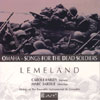Aubert Lemeland Omaha; Songs for the Dead Soldiers
War memories evoked in stark images but perhaps the approach is too soft
View record and artist detailsRecord and Artist Details
Composer or Director: Aubert Lemeland
Genre:
Vocal
Label: Skarbo
Magazine Review Date: 10/2005
Media Format: CD or Download
Media Runtime: 65
Mastering:
Stereo
DDD
Catalogue Number: SK2338

Tracks:
| Composition | Artist Credit |
|---|---|
| Songs for the Dead Soldiers |
Aubert Lemeland, Composer
Aubert Lemeland, Composer Carole Farley, Soprano Chœur Francine Bessac Grenoble Instrumental Ensemble Marc Tardue, Conductor |
| Omaha |
Aubert Lemeland, Composer
Aubert Lemeland, Composer Chœur Francine Bessac Marc Tardue, Conductor |
| Concerto for Harp and Strings |
Aubert Lemeland, Composer
Aubert Lemeland, Composer Grenoble Instrumental Ensemble Marc Tardue, Conductor Sabine Chefson, Harp |
| Elegy in Memory of Samuel Barber |
Aubert Lemeland, Composer
Aubert Lemeland, Composer Grenoble Instrumental Ensemble Marc Tardue, Conductor |
Author: Lawrence Johnson
Aubert Lemeland’s Songs for the Dead Soldiers was inspired by images and grateful childhood memories of the liberation by American troops of the French composer’s home town, La Haye du Puits. This cycle of six songs sets a variety of texts, primarily from American writers who served during the war, in a secular requiem of sorts – what Lemeland calls ‘a rise, fall and moment of rest’. The opening song, ‘The Battle Hymn’, presents an elegiac rocking theme for strings, plaintive and somewhat harmonically crunched, with melismatic writing for the solo soprano. ‘Sea Shells’ continues the sombre, slow-moving style. Yet a lack of bite and marmoreal smoothness tend to predominate, with the stanzas broken up in a way that doesn’t always serve the words’ continuity.
‘Memories of a Lost War’ offers a welcome pick-up in tempo, set against Louis Simpson’s spare, compelling lines, but ‘Morning at Arnhem’ returns to the soft-focus string-writing and lack of expression that fails to realise the stark power of the texts. Carole Farley’s narrow range of vocal colours and generalised approach doesn’t help matters, and her voice turns shrill and brittle in the leaping high tessitura. The disc is filled out with three less ambitious works, which make a more favourable impression. Omaha for women’s choir is set to Lemeland’s own heartfelt text, inspired by a visit to the American military cemetery at Colleville-sur-Mer; the gentle polyphony conveys an affecting, glowing solace. The Concerto for harp and strings presents a rapt, introspective beauty in the opening Lento, contrasted with a percussive middle section and a buoyant finale. The concise Elegy in Memory of Samuel Barber returns to the stately homage style of the cycle but with a similar lack of memorable thematic material.
The handsomely packaged set includes a booklet with a fascinating essay by Charles Lemeland, the composer’s brother, on their war years in La Haye and experiences growing up during the occupation and liberation.
‘Memories of a Lost War’ offers a welcome pick-up in tempo, set against Louis Simpson’s spare, compelling lines, but ‘Morning at Arnhem’ returns to the soft-focus string-writing and lack of expression that fails to realise the stark power of the texts. Carole Farley’s narrow range of vocal colours and generalised approach doesn’t help matters, and her voice turns shrill and brittle in the leaping high tessitura. The disc is filled out with three less ambitious works, which make a more favourable impression. Omaha for women’s choir is set to Lemeland’s own heartfelt text, inspired by a visit to the American military cemetery at Colleville-sur-Mer; the gentle polyphony conveys an affecting, glowing solace. The Concerto for harp and strings presents a rapt, introspective beauty in the opening Lento, contrasted with a percussive middle section and a buoyant finale. The concise Elegy in Memory of Samuel Barber returns to the stately homage style of the cycle but with a similar lack of memorable thematic material.
The handsomely packaged set includes a booklet with a fascinating essay by Charles Lemeland, the composer’s brother, on their war years in La Haye and experiences growing up during the occupation and liberation.
Discover the world's largest classical music catalogue with Presto Music.

Gramophone Digital Club
- Digital Edition
- Digital Archive
- Reviews Database
- Full website access
From £8.75 / month
Subscribe
Gramophone Full Club
- Print Edition
- Digital Edition
- Digital Archive
- Reviews Database
- Full website access
From £11.00 / month
Subscribe
If you are a library, university or other organisation that would be interested in an institutional subscription to Gramophone please click here for further information.




